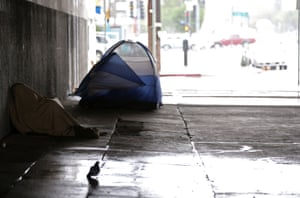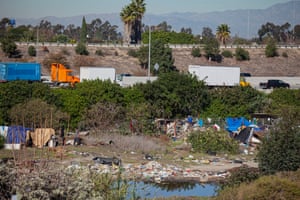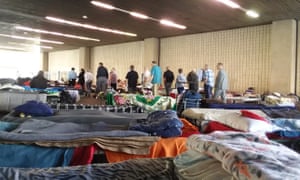'If I get it, I die': homeless residents say inhumane shelter conditions will spread coronavirus
As California officials urge residents to avoid physical contact, residents worry the facilities are not prepared to cope with the outbreak
Sam Levin in Los Angeles Thu 19 Mar 2020 THE GUARDIAN

A homeless man huddles under a blanket in Los Angeles.
Photograph: Luis Sinco/Los Angeles Times via Getty Images
Southern California homeless shelter residents say long-running unsanitary and inhumane conditions now put them at severe risk of death amid the rapid spread of the coronavirus.
As California officials this week urged millions of residents to stay inside and avoid physical contact to slow the spread of Covid-19, people living in several overcrowded homeless shelters in Orange county say they continue to sleep in rows of beds within a few feet of each other, and that they often lack basic hygiene supplies and amenities.
The residents report a variety of serious problems, including empty soap dispensers, a lack of toilet paper, no hot water, broken sinks, no working thermometers, blood-stained walls and infrequent cleaning. They worry the shelters are ill-prepared to cope once the spread of the virus intensifies in the US.
“It’s appalling. One person gets a cough and everyone gets it,” said Wendy Powitzky, 49, who has been living at the La Mesa shelter in Anaheim in southern California for months. “We’ve already been passing around a standard cold.”
Some days, the soap containers in the bathroom go empty: “Most people don’t have their own. So I guess everyone else is just washing their hands with water.”
California has the largest homeless population in the US, with more than 40,000 people living in shelters on a given night. Advocates and shelter residents have warned for years that many of the facilities are underregulated and underfunded, and that conditions in some may pose significant health hazards. Amid the coronavirus crisis, they fear, those circumstances could make the spread of the virus in shelters near-inevitable.
Homeless tents line the street in downtown Los Angeles.
Southern California homeless shelter residents say long-running unsanitary and inhumane conditions now put them at severe risk of death amid the rapid spread of the coronavirus.
As California officials this week urged millions of residents to stay inside and avoid physical contact to slow the spread of Covid-19, people living in several overcrowded homeless shelters in Orange county say they continue to sleep in rows of beds within a few feet of each other, and that they often lack basic hygiene supplies and amenities.
The residents report a variety of serious problems, including empty soap dispensers, a lack of toilet paper, no hot water, broken sinks, no working thermometers, blood-stained walls and infrequent cleaning. They worry the shelters are ill-prepared to cope once the spread of the virus intensifies in the US.
“It’s appalling. One person gets a cough and everyone gets it,” said Wendy Powitzky, 49, who has been living at the La Mesa shelter in Anaheim in southern California for months. “We’ve already been passing around a standard cold.”
Some days, the soap containers in the bathroom go empty: “Most people don’t have their own. So I guess everyone else is just washing their hands with water.”
California has the largest homeless population in the US, with more than 40,000 people living in shelters on a given night. Advocates and shelter residents have warned for years that many of the facilities are underregulated and underfunded, and that conditions in some may pose significant health hazards. Amid the coronavirus crisis, they fear, those circumstances could make the spread of the virus in shelters near-inevitable.

Homeless tents line the street in downtown Los Angeles.
Photograph: Apu Gomes/AFP via Getty Images
A significant number of shelter residents are older and already live with serious health problems. The ongoing problems with sanitation and accommodations in some of the shelters make it largely impossible for many residents to comply with Covid-19 precautionary measures recommended by the Centers for Disease Control, according to Eve Garrow, the homelessness policy analyst with the ACLU of Southern California.
What’s more, some in shelters have been waiting for years for more permanent housing due to a severe shortage of affordable homes for low-income renters. If residents leave now, they could lose their spot and also face police harassment if they sleep outside. Despite these risks, some are fleeing the facilities to avoid the virus and returning to encampments, even as officials urge people to seek shelter.
“It’s a recipe for disaster,” said Garrow, who spent more than a year investigating conditions in local shelters for a 2019 report documenting the unsafe and toxic environments. “If coronavirus impacts people in shelters, it’s going to spread like wildfire.”
Risk death inside or arrest outside: ‘Where do we go?’
Homeless organizations have been sounding the alarm for weeks, warning that the coronavirus could cause catastrophic harm to unhoused communities amid the absence of a coordinated strategy to aid people already struggling to survive in tents and overcrowded shelters. Officials in Los Angeles moved on Tuesday to temporarily stop some of the sweeps of encampments due to coronavirus.
Residents in four homeless facilities in Orange county, the region Garrow studied, shared with the Guardian photos and accounts of long-running problems that have sparked new fears amid the corona crisis.
A significant number of shelter residents are older and already live with serious health problems. The ongoing problems with sanitation and accommodations in some of the shelters make it largely impossible for many residents to comply with Covid-19 precautionary measures recommended by the Centers for Disease Control, according to Eve Garrow, the homelessness policy analyst with the ACLU of Southern California.
What’s more, some in shelters have been waiting for years for more permanent housing due to a severe shortage of affordable homes for low-income renters. If residents leave now, they could lose their spot and also face police harassment if they sleep outside. Despite these risks, some are fleeing the facilities to avoid the virus and returning to encampments, even as officials urge people to seek shelter.
“It’s a recipe for disaster,” said Garrow, who spent more than a year investigating conditions in local shelters for a 2019 report documenting the unsafe and toxic environments. “If coronavirus impacts people in shelters, it’s going to spread like wildfire.”
Risk death inside or arrest outside: ‘Where do we go?’
Homeless organizations have been sounding the alarm for weeks, warning that the coronavirus could cause catastrophic harm to unhoused communities amid the absence of a coordinated strategy to aid people already struggling to survive in tents and overcrowded shelters. Officials in Los Angeles moved on Tuesday to temporarily stop some of the sweeps of encampments due to coronavirus.
Residents in four homeless facilities in Orange county, the region Garrow studied, shared with the Guardian photos and accounts of long-running problems that have sparked new fears amid the corona crisis.
Photograph: ACLU of Southern California
“If I start coughing, they may throw me out and I will have no place to go,” said one homeless man in his 70s, currently living at The Courtyard, a Santa Ana shelter where the ACLU last year found “squalid conditions”. The resident, who has spent years at the facility, asked to remain anonymous for fear of retaliation from the shelter. He has serious health problems and worries coronavirus would kill him: “If I catch it and die, this miserable life will be over for me.”
His shelter, a former bus terminal that houses more than 400 people in cots, has multiple broken sinks and dysfunctional soap dispensers, he said: “We have to supply our own soap, and then we have to wait in line to get a sink that works.”
Joseph Grubb, a 53 year old who has been staying at a Salvation Army shelter in Anaheim for months, said one men’s bathroom has blood on the walls and the other one has no soap: “The coronavirus is going around like crazy and they are not even cleaning the bathrooms up … You have to go into the bloody one to wash your hands. I try not to touch the door and kick it open.”
With coronavirus concerns and the conditions not improving, Grubb said he decided to leave the Salvation Army, even though he has nowhere else to go. He said he was worried about the older residents remaining: “If the virus does hit there, they are gone.”
Homeless camp along the Los Angeles river.
“If I start coughing, they may throw me out and I will have no place to go,” said one homeless man in his 70s, currently living at The Courtyard, a Santa Ana shelter where the ACLU last year found “squalid conditions”. The resident, who has spent years at the facility, asked to remain anonymous for fear of retaliation from the shelter. He has serious health problems and worries coronavirus would kill him: “If I catch it and die, this miserable life will be over for me.”
His shelter, a former bus terminal that houses more than 400 people in cots, has multiple broken sinks and dysfunctional soap dispensers, he said: “We have to supply our own soap, and then we have to wait in line to get a sink that works.”
Joseph Grubb, a 53 year old who has been staying at a Salvation Army shelter in Anaheim for months, said one men’s bathroom has blood on the walls and the other one has no soap: “The coronavirus is going around like crazy and they are not even cleaning the bathrooms up … You have to go into the bloody one to wash your hands. I try not to touch the door and kick it open.”
With coronavirus concerns and the conditions not improving, Grubb said he decided to leave the Salvation Army, even though he has nowhere else to go. He said he was worried about the older residents remaining: “If the virus does hit there, they are gone.”

Homeless camp along the Los Angeles river.
Anti-homeless laws in some cities force people into shelters.
Photograph: Education Images/Universal Images Group via Getty Images
Because the city of Anaheim also has a number of anti-homeless laws meant to prevent sleeping outside and force people in shelters, Grubb said he is now sleeping in a tent, living in fear police will cite or jail him: “Every night, we don’t know if we’re going to get arrested for being where we’re at, or harassed.” But it was preferable to the shelter, he added.
Callie Rutter, 56, recently lived in the Bridges at Kraemer Place shelter in Anaheim and is now in a care program fighting lung cancer. She predicts the coronavirus would spread at the shelter just like the notorious “Kraemer cough” had done in the past. “It’s a mass shelter in the middle of winter. But, even if it was summer, it wouldn’t make a difference.”
Powitzky lived in the La Mesa shelter, where she slept in a dorm-like cubicle with three other women within a few feet of her.
Powitzky said she left the La Mesa shelter this week over coronavirus fears and was told she would lose her spot. She said there have been basic plumbing problems at the shelter with shower water not draining properly, creating further risks of spreading diseases. When she reported her recent potential fever, staff said they didn’t have a functioning thermometer to take her temperature and ended up sending her to the hospital, where she discovered she was sick, but not with coronavirus.
Powitzky said she has repeatedly complained about unsanitary conditions and the response was, in effect, “If you don’t like it you can leave.”
“But where are we going to go?” she asked. “We can’t be in the streets.”
The dangers of mass shelter quarantines
There is no single state entity with oversight over safety in shelters, which are run by a patchwork of not-for-profits and local municipalities and have often lacked the training and resources needed to support a surging homeless population with complex needs. Solving longstanding structural problems during an unprecedented health crisis is a huge challenge for the organizations, but advocates have urged government agencies to have a unified strategy to prioritize resources and supports for this population, given that they are the most vulnerable.
Mike Lyster, a spokesman for the city of Anaheim, which oversees the Salvation Army shelter, did not respond to specific questions about the bathrooms, saying in an email that the shelter has a “high standard of facilities”. He added: “There always can also be an isolated issue, but bathrooms are regularly cleaned and addressed.”
Paul Leon, CEO of the Illumination Foundation, which runs La Mesa, said the shelter recently had a problem with a thermometer but that it was now monitoring all residents’ temperatures multiple times a day. He said the shelter has no soap shortage, though there may have been an “isolated incident”, adding that the facility has recently stocked up on sanitizer and other supplies.
Leon said the shelter was trying to be strict about when people enter and exit to minimize possible Covid-19 transmission: “The shelters could be the safest place for them.” He said the situation was “under control”, but added, “Next week, we’ll see how bad it gets.”
At the Bridges shelter, staff are doing widespread screening for possible symptoms and are prepared to isolate people as needed, said Larry Haynes, director of the not-for-profit that runs the facility.
Some shelters are now preparing for lockdowns and quarantines if outbreaks occur. While those restrictions could help to stop the spread of the virus to the outside world, some advocates warned that they could put the most vulnerable people in the shelters at greater risk to catch the virus
Because the city of Anaheim also has a number of anti-homeless laws meant to prevent sleeping outside and force people in shelters, Grubb said he is now sleeping in a tent, living in fear police will cite or jail him: “Every night, we don’t know if we’re going to get arrested for being where we’re at, or harassed.” But it was preferable to the shelter, he added.
Callie Rutter, 56, recently lived in the Bridges at Kraemer Place shelter in Anaheim and is now in a care program fighting lung cancer. She predicts the coronavirus would spread at the shelter just like the notorious “Kraemer cough” had done in the past. “It’s a mass shelter in the middle of winter. But, even if it was summer, it wouldn’t make a difference.”
Powitzky lived in the La Mesa shelter, where she slept in a dorm-like cubicle with three other women within a few feet of her.
Powitzky said she left the La Mesa shelter this week over coronavirus fears and was told she would lose her spot. She said there have been basic plumbing problems at the shelter with shower water not draining properly, creating further risks of spreading diseases. When she reported her recent potential fever, staff said they didn’t have a functioning thermometer to take her temperature and ended up sending her to the hospital, where she discovered she was sick, but not with coronavirus.
Powitzky said she has repeatedly complained about unsanitary conditions and the response was, in effect, “If you don’t like it you can leave.”
“But where are we going to go?” she asked. “We can’t be in the streets.”
The dangers of mass shelter quarantines
There is no single state entity with oversight over safety in shelters, which are run by a patchwork of not-for-profits and local municipalities and have often lacked the training and resources needed to support a surging homeless population with complex needs. Solving longstanding structural problems during an unprecedented health crisis is a huge challenge for the organizations, but advocates have urged government agencies to have a unified strategy to prioritize resources and supports for this population, given that they are the most vulnerable.
Mike Lyster, a spokesman for the city of Anaheim, which oversees the Salvation Army shelter, did not respond to specific questions about the bathrooms, saying in an email that the shelter has a “high standard of facilities”. He added: “There always can also be an isolated issue, but bathrooms are regularly cleaned and addressed.”
Paul Leon, CEO of the Illumination Foundation, which runs La Mesa, said the shelter recently had a problem with a thermometer but that it was now monitoring all residents’ temperatures multiple times a day. He said the shelter has no soap shortage, though there may have been an “isolated incident”, adding that the facility has recently stocked up on sanitizer and other supplies.
Leon said the shelter was trying to be strict about when people enter and exit to minimize possible Covid-19 transmission: “The shelters could be the safest place for them.” He said the situation was “under control”, but added, “Next week, we’ll see how bad it gets.”
At the Bridges shelter, staff are doing widespread screening for possible symptoms and are prepared to isolate people as needed, said Larry Haynes, director of the not-for-profit that runs the facility.
Some shelters are now preparing for lockdowns and quarantines if outbreaks occur. While those restrictions could help to stop the spread of the virus to the outside world, some advocates warned that they could put the most vulnerable people in the shelters at greater risk to catch the virus
downtown Los Angeles in front of city hall.
Photograph: Mike Blake/Reuters
“If anyone comes down with it, we’re going to get locked down,” said Joshua Ogle, a 41-year-old La Mesa resident who has lived in multiple Orange county shelters, adding that he feared for his friends who were seniors and how residents’ mental health might suffer under quarantine. “People are going to really lose their minds.”
Garrow said she feared quarantines would do nothing to fix conditions that promote contagions. In a letter to state officials on Monday, she instead called for health and sanitation standards and social distancing practices to be adopted and enforced at shelters, for the state to bring hygiene supplies and coronavirus testing and treatment to the facilities and for officials to provide housing vouchers so people can self-isolate.
Meanwhile, California’s governor said he was working to make hotels and trailers available to homeless people to get them inside and prevent mass outbreaks, and LA’s mayor said he would make 6,000 beds available at city recreation centers.
A spokesperson for Orange county, which oversees several shelters, including The Courtyard, did not answer specific questions but said the county was evaluating federal and state guidelines and resources to figure out solutions for homeless people: “This may include creating appropriate spaces for isolation such as temporary structures, tents and trailers, and or motels and hotels as available.”
Davon Brown, a resident who lives at an LA park encampment, said he felt safer being able to isolate in a tent and would not consider a shelter: “If you want more people to die, you put them in a shelter.”
One Salvation Army resident in his 60s, who requested anonymity for fear of retribution, said he should not have been in this predicament in the first place. He has been in the shelter for over two years, waiting for housing. He thought by now he’d have his own roof over his head and be safe: “It just hasn’t happened, and it doesn’t look like it’s going to.” And now he faces a high risk of serious illness or worse, he said: “If I get this, I could die.”
“If anyone comes down with it, we’re going to get locked down,” said Joshua Ogle, a 41-year-old La Mesa resident who has lived in multiple Orange county shelters, adding that he feared for his friends who were seniors and how residents’ mental health might suffer under quarantine. “People are going to really lose their minds.”
Garrow said she feared quarantines would do nothing to fix conditions that promote contagions. In a letter to state officials on Monday, she instead called for health and sanitation standards and social distancing practices to be adopted and enforced at shelters, for the state to bring hygiene supplies and coronavirus testing and treatment to the facilities and for officials to provide housing vouchers so people can self-isolate.
Meanwhile, California’s governor said he was working to make hotels and trailers available to homeless people to get them inside and prevent mass outbreaks, and LA’s mayor said he would make 6,000 beds available at city recreation centers.
A spokesperson for Orange county, which oversees several shelters, including The Courtyard, did not answer specific questions but said the county was evaluating federal and state guidelines and resources to figure out solutions for homeless people: “This may include creating appropriate spaces for isolation such as temporary structures, tents and trailers, and or motels and hotels as available.”
Davon Brown, a resident who lives at an LA park encampment, said he felt safer being able to isolate in a tent and would not consider a shelter: “If you want more people to die, you put them in a shelter.”
One Salvation Army resident in his 60s, who requested anonymity for fear of retribution, said he should not have been in this predicament in the first place. He has been in the shelter for over two years, waiting for housing. He thought by now he’d have his own roof over his head and be safe: “It just hasn’t happened, and it doesn’t look like it’s going to.” And now he faces a high risk of serious illness or worse, he said: “If I get this, I could die.”


No comments:
Post a Comment